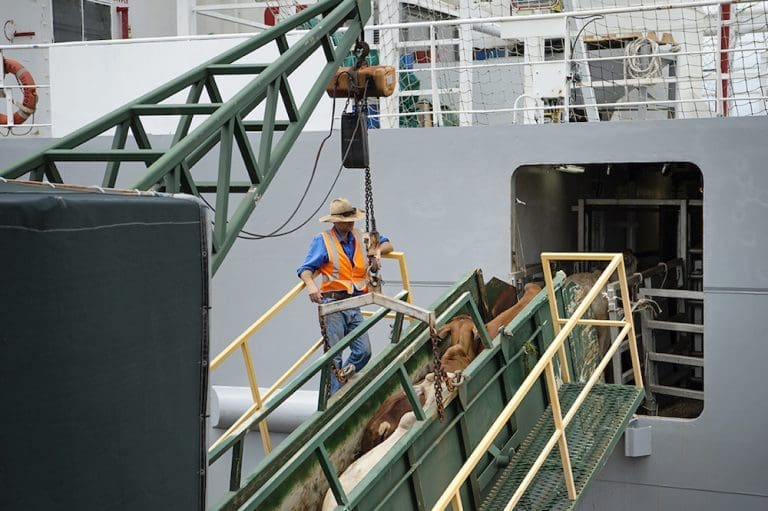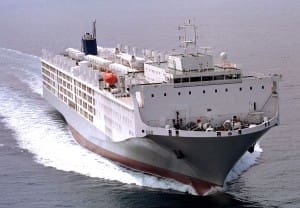AUSTRALIAN stock handlers and veterinarians working on live export vessels say they are unable to secure basic health insurance for their voyages, which is adding to the pressures of working in the COVID era.
A large number of “stockies” and veterinarians are hired for voyages as independent contractors, not as export company employees, and are required to secure their own personal insurance for voyages.
But they are reporting that despite exhaustive inquiries they have been unable to find a single provider that will insure them, and are calling on industry bodies to help.
Barry Gunson is a veteran of the industry having clocked up hundreds of voyages on export vessels since the 1980s.
He is due to load again for his next voyage within the next week but is worried he will be embarking without even basic medical cover.
The risk posed by COVID has added a layer of complexity to insurance policies which is understood to be the main reason independent contractors are now finding it difficult to secure insurance.
Medical costs for uninsured travellers in foreign countries can be notoriously expensive, as the Federal Government’s Smart Traveller website points out: “If you end up injured or sick while overseas, you’ll be footing the hospital bill and the cost of flying home. In some cases, the costs for you or your family could be hundreds of thousands of dollars.”
The Gulf Livestock 1 tragedy in September last year has also brought the insurance issue into sharper focus.
When accredited stock men and women and veterinarians board livestock export vessels they are asked to sign a letter of indemnity stating they have full insurance cover.
Mr Gunson estimates most stockies and vets currently do not have coverage.
He said he was hoping industry service organisation LiveCorp would be able to help onboard stockmen and women and veterinarians to find insurance coverage, as it had once done before.
Years ago after the September 11, 2001 terrorist attacks in New York when many insurance providers suddenly withdrew coverage for shipboard workers on vessels travelling to areas such as the Middle East, LiveCorp stepped in and provided an insurance program for stockies and veterinarians, Mr Gunson said, but the program was dropped as normal insurance services began to return within a few years.
LiveCorp CEO Sam Brown said the organisation stopped providing insurance after getting advice that shipboard staff weren’t actually covered because they did not work directly for LiveCorp.
“LiveCorp provides training for shipboard stockpersons and manages the accreditation process – they’re our front-line people and we care about their wellbeing. This includes looking at the insurance issue several times over the years, and continuing to provide counselling for both stockies and shipboard vets following the Gulf Livestock 1 tragedy,” he said.
“However, we don’t employ them and have to remain mindful of our role as a research and development organisation.”
Mr Gunson said he and other stockmen and women were become more concerned about the continuing to work on live export vessels without insurance.
“We only want basic medical coverage, not all the other things like lost baggage, hotel rooms and missed planes, we just need that health cover if something happens on the ship, that is all,” he said.
“If you get kicked up there, a broken arm, which can happen easily, it would break you and could cost you hundreds of thousands to get you back home again.
“Between the quarantines and everything else now, the insurance makes it very difficult.
“I am loading soon so I am just hoping something might be in line by then.”
The insurance issue comes at a time when accredited stock men and women and veterinarians are in short supply due to COVID quarantine restrictions, which have become even more stringent in recent months.
Previously, stock men and women and veterinarians returning on live export vessels from international ports could count the time spent on the ballast voyage back to Australia toward their mandatory 14 day quarantine period upon disembarking in Australia.
However, after a handful of COVID detections on livestock export vessels in 2020, returning crew members must now complete 14 days of land based isolation, meaning more stockies and vets are tied up either on boat voyages or sitting in quarantine, reducing the number of accredited workers available for voyages.
Compounding the shortage are recently implemented Federal Government rule changes (ASEL 3.0) which now require livestock vessel with more than 3000 cattle to have a minimum of two stock handlers on board.
Anxious for a solution
The insurance problem has been building for over a year and affected workers are anxious for a solution.
Jack Webb from exporting company North Australian Cattle Company (NACC) in Townsville said he has been talking to every insurance company he can find, including the Insurance Council of Australia, but said he has not been able to find a single company willing to offer insurance coverage to individuals travelling on livestock export vessels internationally in the COVID era.
“We’re getting a lot of pushback and little help from anyone trying to solve this issue,” he said.
“We just want a health insurance because if someone gets injured or sick on board it is a very expensive exercise to get Medevaced.
“Whenever you are talking about international travel and leaving Australian soil, that insurance is not being offered as an option.”
Mr Webb said more stock men and women were becoming hesitant to board vessels without insurance coverage.
“And because of COVID 19 we’re at an all-time low for stock person availability,” he said.
“If we have someone hop on a boat for us we look at them as one of us, we want them to be looked after, to have peace of mind they have coverage, but we are having so much difficulty with it.”
Mr Brown said LiveCorp has been talking to shipboard stockpersons and vets who have experienced challenges identifying appropriate insurance, including both travel/medical insurance and professional indemnity insurance.
COVID-19 had made it more difficult for everyone to access travel insurance for a wide range of people and industries, and the issue was not restricted to live exports.
Insurance was not something that LiveCorp could provide, he said, as the stockies and AAVs do not work for LiveCorp.
Responsibility for insurance came down to how people were employed. Exporters are responsible for providing insurance if they employ stock handers and vets as part of their staff. Anyone employed as a contractor is responsible for securing their own insurance.
Mr Brown said stockies and AAVs were advised to carefully check the terms and conditions of any insurance they do find, to ensure it covered their situation. For instance, the type of insurance suitable for a holiday may not be appropriate.
“LiveCorp has been exploring options available for stock persons and AAVs for some time, and providing advice to both groups,” he said.
“We’ve been working hard to facilitate conversations with an insurance broker who understands the industry and is willing to provide advice on what policies may be available.
“Stockies and AAVs are welcome to contact LiveCorp for details, and we’re also keen to hear from any other insurance companies or brokers who may be able to help.”
If any independent stockmen or women or AAVs have been able to secure insurance coverage and are happy to share that information they can contact LiveCorp via its online contact page here





Thanks all on update very important area we have to look after our workforce and make sure everyone is safe
I have only recently became a stockman for the live export vessels and was advised to have my own personal and public liability cover .
After asking the few stockman I met plus export companies plus Livecorp and insurance brokers I wasn’t able to get a policy from anyone
This is the whole point of the wide problem Shaun, and it was occuring ‘Way’ before Covid-19 has been the blame. It’s an industry problem that’s been kicked around for some time.
I would like a ‘Silk’ to look at ‘Mandatory requirements’. And! All the agreements in place between Fed.Govt, Livex, and its opponents. A consensus has been reached previously! But! The doors still flapping ing the gale!! Good luck.
LiveCorp are quick to point out what they “can’t do” in the first instance. It’s my belief these essential ship stockpeople are on ships because of government and industry agreed requirements, regardless.
They also must sign two, yes (2), waivers, one from the ship they are on and second from the company and its wharf-face operator, that either employs or contracts them.
No wonder they are marooned into the burecratic wilderness.
This industry agrees to laws thrust upon them. It is very wrong to abandon the lowest, but, most essential person in the chain in order that they sail, at all. ALEC, needs to step up here, not their levy and paper shuffling department.
Let’s hope for some solid protection.